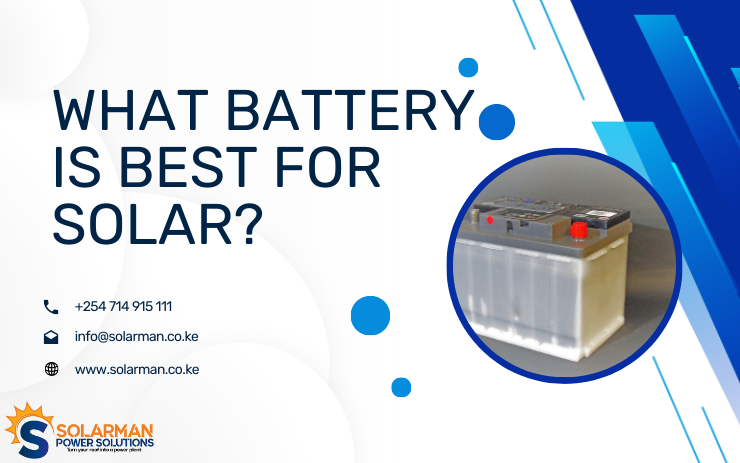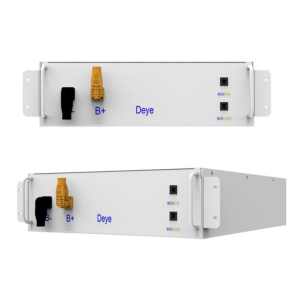Looking for the best solar battery in Kenya? Solar battery prices can vary based on the type and capacity of the battery you need.
For small residential setups, expect to spend between KSh 30,000 to KSh 200,000. The best solar batteries—like lithium-ion options—offer greater efficiency and a longer lifespan, making them the preferred choice for homes and businesses.
In this guide, we’ll explore everything you need to know about solar battery installation and how Solarman can help you get the best solution for your energy needs.
Table of Contents
Introduction
Solar energy is becoming a game-changer for homes and businesses alike, especially in Kenya.
But to truly maximize the benefits of solar power, you need a high-quality battery to store the energy you generate. This leads to the essential question: what battery is best for solar?
In this guide, we’ll explore different types of solar batteries, what factors you should consider when making your choice, and why Solarman is the best place to find the right battery for your solar system.
Why Do You Need a Solar Battery?
Solar batteries are critical for anyone looking to get the most out of their solar installation. They store the excess energy your panels produce during the day so you can use it later when the sun isn’t shining or during power outages.
Think of it like having a backup generator, but much more efficient and environmentally friendly.
Not only do you cut down on energy costs, but you also ensure that you’re not reliant on the grid, especially during peak hours when electricity costs more.
Types of Solar Batteries
There are several types of batteries used for solar energy storage, each with its strengths and weaknesses. Let’s break them down.
Lead-Acid Batteries
Lead-acid batteries are one of the oldest and most cost-effective options for solar storage. They have been used for decades, especially in off-grid systems.
However, they require regular maintenance and have a shorter lifespan compared to modern alternatives.
Lithium-Ion Batteries
Lithium-ion batteries are the most popular choice today, and for good reason. They offer higher efficiency, longer lifespan, and are much easier to maintain than lead-acid batteries.
These batteries are perfect for homeowners looking for a low-maintenance, long-lasting solution.
Flow Batteries
Flow batteries are a newer, niche option designed for large-scale solar installations. They are highly durable and can last for decades. However, they come with a hefty price tag, making them impractical for most residential setups.
Nickel-Based Batteries
Nickel-based batteries are incredibly durable and can operate in extreme conditions. While not as common in solar installations, they are sometimes used in specific industrial applications.
Lead-Acid Batteries: Pros and Cons
Pros:
- Cost-effective upfront
- Suitable for off-grid systems
- Simple technology
Cons:
- Requires frequent maintenance
- Shorter lifespan (3-5 years)
- Lower depth of discharge (DoD)
Lithium-Ion Batteries: The Popular Choice
Pros:
- Longer lifespan (10-15 years)
- High efficiency (90%+)
- Low maintenance
- Scalable for both small and large installations
Cons:
- Higher upfront cost
Lithium-ion batteries have become the gold standard for residential and commercial solar systems, especially in countries like Kenya, where reliability is crucial.
- Solar Battery
Deye BOS-G 5.12Kwh H/V Solar Battery System
KSh 210,000Original price was: KSh 210,000.KSh 195,000Current price is: KSh 195,000. Add to cart
GEL Batteries: A Niche Option
Pros:
- Extremely long lifespan (20+ years)
- High durability and performance
Cons:
- Expensive and complex to install
- Best suited for large-scale projects
Nickel-Based Batteries: Durable but Rare
Pros:
- High durability, especially in harsh environments
- Long operational life
Cons:
- Rarely used in residential solar systems
- More expensive than lead-acid but less efficient than lithium-ion
Key Factors to Consider When Choosing a Solar Battery
Battery Lifespan and Cycles
The lifespan of a solar battery is measured in cycles, meaning the number of times it can be charged and discharged before its capacity starts to diminish. Batteries with more cycles will last longer.
Depth of Discharge (DoD)
DoD refers to how much of the battery’s capacity can be used before it needs to be recharged. A higher DoD means you can use more of the battery’s power, which is crucial for maximizing efficiency.
Capacity and Power Ratings
Capacity refers to how much energy the battery can store, while power rating indicates how much energy it can deliver at once. Depending on your needs, you may want a higher capacity or power rating.
Efficiency and Charge/Discharge Rates
Efficiency measures how much energy you can get out of the battery compared to what you put in. Higher efficiency means less energy loss during storage and discharge.
Solar Battery Prices in Kenya
Solar battery prices in Kenya can vary significantly based on the type of battery and its capacity. On average, Solar Battery Prices in Kenya range from KSh 30,000 to KSh 200,000.
Lithium-ion batteries tend to be more expensive but offer superior performance, while lead-acid batteries are more affordable but require frequent maintenance.
Factors that influence solar battery prices include the brand, storage capacity, and expected lifespan.
What Makes Lithium-Ion Batteries the Best Solar Battery in Kenya?
Reliability and Performance in Kenyan Conditions
Lithium-ion batteries are particularly well-suited to Kenya’s climate, offering durability and reliable performance even during extreme weather conditions.
Long-Term Cost Savings
Though they have a higher upfront cost, lithium-ion batteries last much longer and require far less maintenance than lead-acid options. Over time, this leads to significant savings, making them the best solar battery in Kenya.
Choosing the Best Battery for Your Solar Installation
Whether you’re looking to power a small home or a large commercial facility, the right battery depends on your energy needs, budget, and the size of your solar system.
For residential installations, lithium-ion batteries are usually the best choice due to their efficiency and long lifespan. For larger commercial setups, flow batteries may offer the durability needed for high-demand energy storage.
Why Buy Your Solar Battery from Solarman?
At Solarman, we offer expert guidance to help you choose the right solar battery for your needs.
Our range includes the best solar batteries in Kenya, including lithium-ion, lead-acid, and flow batteries. Plus, we provide professional installation and maintenance services to ensure your system runs smoothly and efficiently.
With competitive pricing and extended warranties, Solarman is your go-to provider for all things solar.
Conclusion
When choosing the best solar battery, it’s essential to consider factors like efficiency, lifespan, and cost.
Lithium-ion batteries often come out on top, especially for their durability and low maintenance needs.
By investing in a high-quality battery from Solarman, you’re not just buying a product — you’re securing long-term energy independence and savings.
FAQs
What is the lifespan of a solar battery?
Most lithium-ion batteries last between 10-15 years, while lead-acid batteries last around 3-5 years.What is the best solar battery for residential homes?
Lithium-ion batteries are the best choice due to their long lifespan and high efficiency.Can I add a solar battery to an existing solar panel system?
Yes, you can add a solar battery to your current solar setup to store excess energy.Does Solarman offer installation services?
Absolutely! Solarman provides full consultation, installation, and maintenance services for all our solar products.How much does a solar battery cost in Kenya?
Solar battery prices in Kenya range from KSh 30,000 to KSh 200,000, depending on the type and capacity of the battery.



